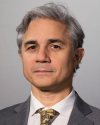By: Ramón Virasoro, MD – Urology of Virginia, PLLC, and Eastern Virginia Medical School
The first time I visited the Dominican Republic (DR), I felt as if I were meeting friends I’d known for a long time. Each physician, nurse and technician was welcoming and full of compassion. They worked hard to care for their people and to make the most of the resources they had.
As a genitourinary reconstructive surgeon, my goal was to offer quality surgery to which many people had no access. Due to the widespread use of motorbikes and poor-quality urethral catheters, genital and urethral pathology is common. Unfortunately, there were no urologists trained who could offer the complex genital surgeries required to treat these patients.
During our first trip in 2013, we evaluated 64 patients but were only able to perform 12 surgeries. I knew that I had to return to help more people. These trips reminded me and our team of the true joy of practicing medicine. The gratitude our patients expressed was immeasurable.
Each time we returned, we were helping people; but by our fourth visit, we realized we had to do more to give patients sustainable access to this specialized care. When health officials in the DR proposed setting up a fellowship program for genitourinary reconstruction, we jumped at the chance.
Over the next two years, my partner Dr. Jessica DeLong and I created and implemented an 18-month training curriculum which was then accredited by the Universidad Autónoma de Santo Domingo (UASD), the oldest university in the Americas. We signed a memorandum of understanding between UASD and Eastern Virginia Medical School. We worked closely with the Ministry of Health and local societies as well as hospitals. Our first fellow graduated this year, and a second is currently in training. In addition to surgical training, our programming has included key improvements in anesthesia education and delivery headed by Dr. Ezequiel Ferrara as well as training for surgical technicians led by one of our team members, Ms. Carmen Baxley.
By training these health care providers, we have dramatically increased access to quality surgical and anesthetic care. We believe a sustainable model for training is necessary to allow local communities to continue providing excellent care well beyond the duration of mission trips.
There is still work to be done, and not just in urology. The WHO has set forth goals for safe surgical care by 2030, and as physicians we can help achieve these aims through volunteerism.
Humanitarian work is not just good for patients, but for the physicians and other health care providers who participate in these trips. As a surgeon in these underserved areas, every patient you care for relies on you as their best chance at a brighter future. Humanitarian work offers a unique opportunity to give back and to reconnect with what it means to be a physician.
Surgical missions cure and prevent disease, and fight physician burnout. With the help of more surgeons and other providers, we have an opportunity to improve quality of care here at home and in communities across the globe.
 Ramón Virasoro is a fellowship-trained urologist with Urology of Virginia who specializes in genitourinary reconstruction. Urologyofva.net
Ramón Virasoro is a fellowship-trained urologist with Urology of Virginia who specializes in genitourinary reconstruction. Urologyofva.net

